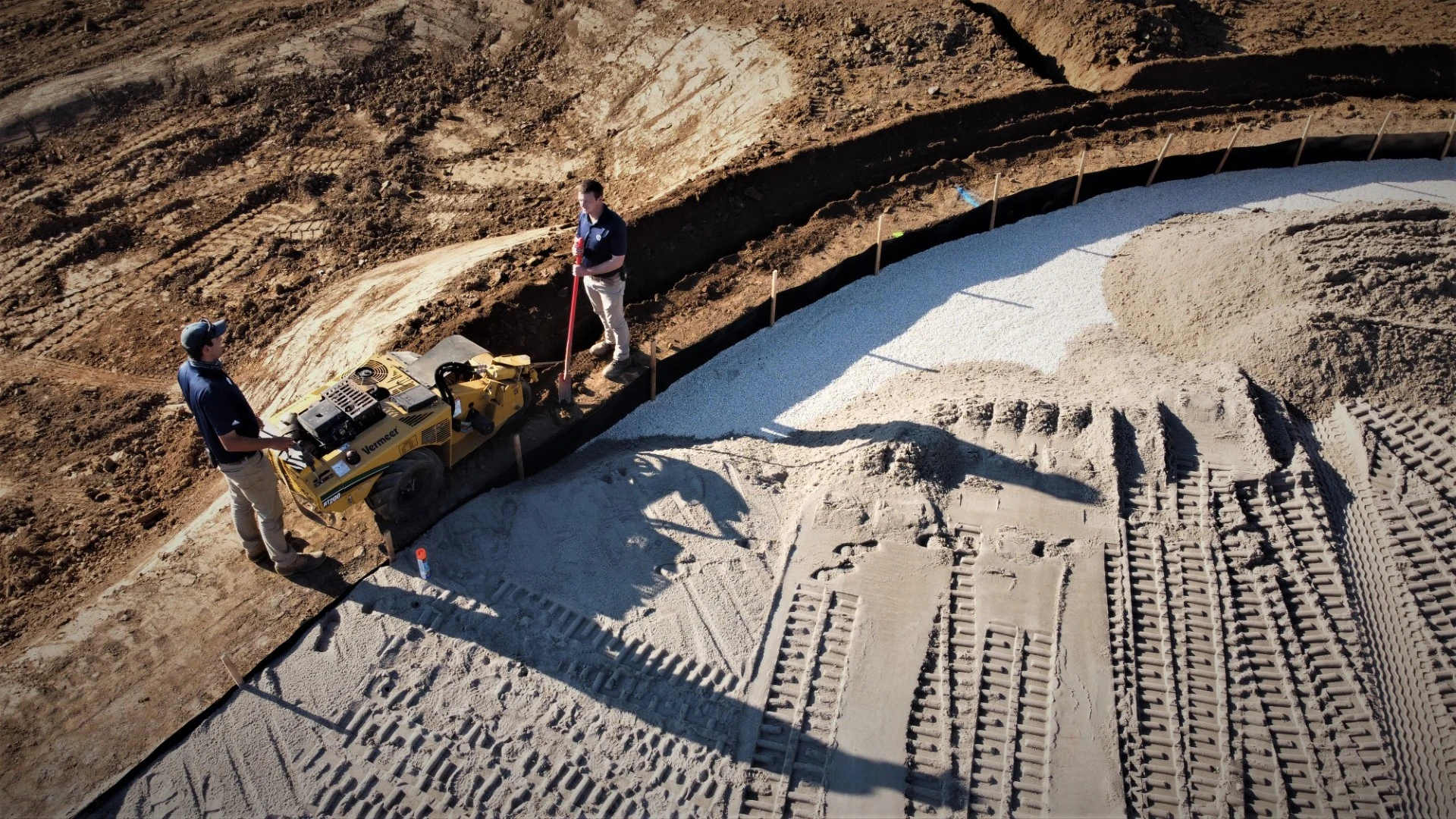
There are numerous examples throughout modern history of individuals who have accomplished much without the advantages that a higher education provides. Countless Americans, from John D. Rockefeller to Michael Dell, have built businesses and successful lives for themselves through hard work and dedication. But for many fields, a higher education is still necessary for growth and advancement.
For Mark Schulze and Edgar Villalobos, two employees at The Club at Carlton Woods in The Woodlands, Texas, currently attending the Rutgers Professional Golf Turf Management School, advancement in the golf course management field is finally within reach. The story of their educational journey started several years ago with a discussion between Carlton Woods general manager/COO Steve Salzman and director of agronomy Tim Huber.
“Tim and I started discussing the ability to develop bench strength in the agronomy department so that an employee could go from hourly, to foreman, assistant and, ultimately, director of agronomy. How do we move people up through the organization?” Salzman says. “Courses are like people. They all have different nuances and health problems. A person might have one elbow that always gives them trouble, and we have one green that always gives us problems. Having that knowledge come through the organization and stay with us for a number of years is very beneficial.”

As a result of that meeting, Huber and Salzman were able to identify high-caliber employees who showed an interest in continuing their profession and education as well as a school that would provide them with the skills and knowledge necessary to progress in the industry.
The Rutgers Professional Golf Turf Management School is a two-year certificate program that provides education from industry experts, hands-on learning and in-depth studies turfgrass science. Over the course of two 10-week sessions, students take multiple classes on a wide-ranging number of topics.
“I’m doing so many classes right now,” Schulze says. “It ranges from plant identification, disease identification, to plant pathology and even the technology of the mowers. Things that our mechanics do, they have classes on that that. There are also classes on public speaking, resume building and professional leadership. It covers everything — the science, the technology, and the professional aspects.”
For Schulze and Villalobos, all the classes and the extra work school entails is nothing compared to the separate journeys that led them to this moment.
Villalobos started at Carlton Woods in 2008 at the age of 18. He was introduced to the 36-hole club by his uncle, who works as an irrigation technician. Having worked in restaurants while attending high school, Villalobos was eager for a change of pace. “When I came here, it was a whole new world to me,” he says. “I fell in love with it because I love being outside. Working restaurants, it was always crowded in a small space. So, I loved the freedom of the outdoors.”
While Huber was not yet with Carlton Woods in 2008, he’s always seen something special in Villalobos. “Since he got here, he’s really just taken an interest in it and flourished,” Huber says. “As hard working as he is, [I told him] he should consider making it a career.”
Villalobos, who moved to the United States at age 8, didn’t originally have the reassurance of permanent residency in the country. This made the commitment and investment to a higher education an uncertain proposition. “Even though he’s bilingual and a smart guy, he just didn’t have that security,” Huber says. But after receiving his permanent residency and beginning his work toward citizenship, Huber believed that the time was right for Villalobos to take the next step in his career.
Villalobos’ newfound education has provided him with a new outlook whenever he’s on the course. “Right now, I have so many years of hands-on experience,” he says. “But school is learning the science behind everything. It’s really good because you’re learning why you’re doing certain things on the course. You learn to question yourself and then provide your own answers. Like, ‘Why do we spray certain chemicals at certain times?’ And now I know the scientific answer to that question. It makes me approach my job differently because now I know how different practices can affect the turf in different ways.”
Upon receiving his certificate from Rutgers, Villalobos will be positioned to rise through the turf ranks. “I think Edgar has a really good opportunity to be an asset to the Club for years as an assistant manager,” Huber says. “And hopefully the day will come when he spreads his wings and goes out on his own. He’s done all the hard work. We’re lucky to have him.”
One might suspect that Schulze’s journey to the Carlton Woods agronomy team began when he played golf at The Woodlands High School, or even in 2009 during his brief stint as a caddie at the Carlton Woods. But, in fact, it began roughly eight years later in the parking lot of a nearby supermarket. “I was working at H-E-B and I met Tim in the parking lot,” Schulze says. “He just came up to me and asked if I knew anyone who needed a job. So, I said, ‘Yeah, I do. I need a job.’”
Huber continues, “When I asked him if he’d be interested in working at a golf course, his eyes lit up. ’I would love it,’ he said to me.”
“Before I worked here, I had no direction in life,” Schulze adds. “I mean, I worked at Target, H.E.B., all these little jobs, and I really had no plan until I came here and took a liking to it. It’s the best job I’ve ever had. I love it. I like working outdoors, I like the technical aspect to it — operating heavy machinery — and also the science to it. Seeing such beautiful facilities here at the Club, it’s an honor. I feel grateful to be working here.”

Like Villalobos, Shulze has found that his studies have already helped him better understand the day-to-day practices on the course. But he also adds that his years of experience at Carlton Woods help him in class. “I have all this hands-on knowledge,” he says. “So even if it’s a difficult scientific talk about plant disease, I’ve seen it and can make all these correlations. That makes things a little bit easier for me.”
Huber is confident that Schulze’s education, passion and drive will serve him well in the industry. “I think he’s got a really good runway here at the Club and he’ll be a great success story,” he says.
For Salzman, Schulze and Villalobos are the first steps in what will hopefully be a continual investment in the strength of the agronomy team at Carlton Woods. But more than that, he views it as a defining trait of the club.
“I would hope that every employee partner here knows that the Club is here to invest in them personally,” Salzman says. “Their professional development obviously pays benefits to the Club, but it will also stick with them forever. The gift of education and knowledge is, I think, the greatest gift.”
“I’m very thankful because this is a great opportunity,” Villalobos says. “And they believe in me even though I haven’t always believed in myself. That little push from Tim, saying, ‘You can do more,’ really helped me.”
Schulze shares the sentiment. “It means a lot to me,” he says. “Having people believe in me is a big deal, and it’s not really something I’m used to. I’m really grateful and honored. I feel a great responsibility to do well and put this club in a good light based on my effort.”
While neither Villalobos nor Shulze have plans to pursue a career outside Carlton Woods in the near future, they both acknowledge and show appreciation for the fact that their future path is now a little bit wider. To Salzman, that was always part of the plan.
“We do not think that either of these individuals are going to retire from Carlton Woods,” Salzman says. “Because of the steps that we’ve put in place for them, they will be able to excel and elevate themselves in the private club or golf industry well beyond Carlton Woods.
“We have given them something that is mobile, that they can take with them. And I think when you’re willing to invest in people, you’re giving them opportunity, whether it’s to provide better for their families or themselves. It’s the opportunity to be a more productive employee for the Club and ultimately the industry. I think all of that is good. I think it’s great.”

Explore the February 2021 Issue
Check out more from this issue and find your next story to read.
Latest from Golf Course Industry
- Standard Golf announces new product lineup for 2025
- The Salt Pond taps Troon for management
- KemperSports selected to manage Swansea Country Club
- From the publisher’s pen: Grab that guide
- Introducing our April 2025 issue
- South Carolina leaders honor golf course superintendent
- One and only
- Wild can be good






